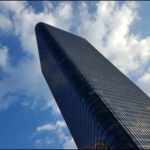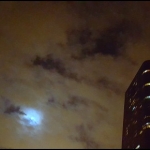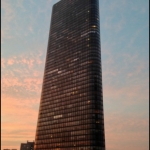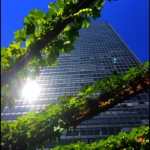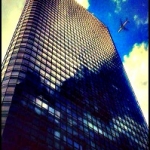Recycling, Required and Dollarwise
March 1, 2016
Recycling benefits the environment. But recycling is also a business, and it only works so long as products can be made more cheaply from recovered materials than from new.
With Green Week coming up in April, TT thought to seek out a representative from our scavenger service to learn something of the business side of recyclables.
The process begins with Park Tower residents separating out items of value to the scavenger, then depositing them in appropriate bins in the laundry room and adjacent to the service elevators on parking level 2P.
The better we consumers do this pre-sort, the more valuable it is to the scavenger, and the lower the price paid to have it hauled away.
Upon leaving our building, the recyclables are taken by truck to a sorting facility, emptied onto the floor, then pushed onto a conveyor belt. Employees tasked with looking for specific types of recyclables watch everything go by and push selected items down their designated chute.
The sorted materials are then packaged and resold to manufacturers to make new products. Since recycling is a business, the price paid must cover all the collection services provided, including hauling, sorting, packaging, etc.
What will and will not be recycled depends on market conditions. Here are some timely tips, passed on by our scavenger and from publications listed at the end of the story.
Plastics
Plastics are made from oil, and the crashing price in that market has impacted the value of recycled plastics.Only items marked #1-5 or #7 are accepted for recycling by our scavenger. Products made from #6 plastic are cheaper to make from new oil. So do not recycle things like red Solo cups and Styrofoam egg cartons (plastic with air bubbles).
Ask your grocer to stock eggs in cardboard – which is recyclable – rather than Styrofoam, which is not.
Non-numbered plastics will be thrown away by the recycler. And unknown plastics mixed in with numbered types degrades their value upon resale. So a plastic bottle that’s numbered goes to recycle, but the cap that’s not goes to trash.
Metals and mixed materials
Metal objects and those combining metal with plastic can be mixed. Metal cans, for instance, can be melted down for reuse, while a little bit of plastic will burn off in the process.A tip for pressurized cans: Before recycling, release any remaining pressurized gas lest the can explode during handling at the recycling center.
Cardboard
The key to recycling paper products is having them clean. If cardboard packaging includes plastic, strip off the plastic. Items like pizza boxes are only recyclable if they are fairly clean. Leftover pizza gunk and grease splotches render them useless. Rule of thumb: If you can turn the box inside-out and take it to the recycling bin without getting yourself greasy, then it’s good enough for the recycler.Bags
Please put your recyclables in a brown paper bag, in a clear plastic bag, or in one of those blue bags designated for recyclables.Sorters need to see everything coming down the conveyor belt. They can’t be sure a sealed black bag doesn’t contain regular, messy garbage, and opening it would contaminate everything else nearby. So It will be thrown out without being examined.
The bottom line
Park Tower requires its residents to recycle – see page 30 of our Rules and Regulations – but urges them to do so with care.And, by the way, it also reduces wear and tear on the garbage disposal chute by eliminating the glass and metal that can damage it and the cardboard that sometimes jams it.
So, recycling benefits the environment and, done correctly, reduces costs to the scavenger service’s customers.
For more on the proper disposal/recycling of household wastes, go to http://www.cityofchicago.org/city/en/progs/env/waste_and_recycling.html



